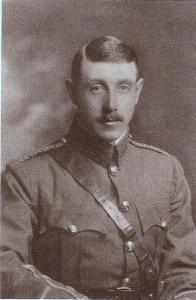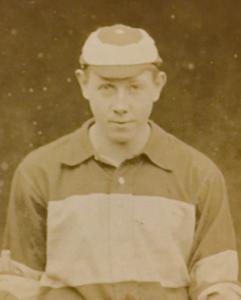
|

|
| Captain Robert Edward DRAKE | |
|
1st Battalion Lincolnshire Regiment Date of birth: 4th January 1878 Date of death: 8th September 1914 Died of wounds aged 36 Buried at Bezu-le-Guery Communal Cemetery |

|
| Robert Edward Drake was born at Great Wratting in Suffolk on the 4th of January 1878 the sixth son of the Reverend John Drake, Rector of Wratting, and Ellen Louisa (nee Todd) Drake of “The Chestnuts”, Long Melford in Suffolk. He was educated at Lancing College where he was in School House from September 1891 to July 1897. He was remembered as a "rather small round boy, with short light hair, very wide set blue eyes and a most friendly countenance." He was a member of the Football XI from 1895 to 1897 and of the Cricket XI in 1896 and 1897. In 1897 the Lancing College Magazine wrote the following on his 1897 cricket season: "Has batted well and consistently throughout the season. His slow left hand bowling, with peculiar run and action, has been useful on several occasions. The best outfield in the XI." He was appointed as a Prefect in 1896 and played cricket for the OLs after he left the school. He was commissioned as a 2nd Lieutenant in the 3rd (Militia) Battalion Suffolk Regiment on the 3rd of September 1898, having passed 2nd in the examination for the Militia. He was promoted to Lieutenant on the 29th of November 1899 and served with the Militia until he received a regular commission as a 2nd Lieutenant in the Lincolnshire Regiment on the 18th of April 1900. He was promoted to Lieutenant on the 1st of May 1902 while serving at Boer Camp, Trichinopoly in South Africa. He was promoted to Captain on the 3rd of August 1912. He was appointed as Adjutant to his battalion on the 4th of November 1913 and was based at Victoria Barracks at Portsmouth. Following the outbreak of war, the 1st Battalion Lincolnshire Regiment entrained at Portsmouth for Southampton where they boarded the SS "Norman" bound for France on the 13th of August 1914. They disembarked the following morning at Le Havre and entrained once more reaching Landrecies on the 16th. They marched to Mons where they fought their first action on the 23rd but had to break off their engagement on the 24th and join what was a general retreat from the Belgian town where they acted as a rearguard for the withdrawal of 9th Brigade. They fought in Sir Horace Smith-Dorrien's delaying action at Le Cateau and then joined the rest of the British Army as they fell back to the Marne Valley. On the night of the 7th of September 1914 the 1st Lincolns were in billets at the village of La Bretonniere which they left at 6am the following morning. At around 10.30am they had stopped to rest in a field near Bezu when their Commanding Officer, Lieutenant Colonel Smith, received a message from Brigade informing him that " a German battery was doing serious damage by shelling our column approaching the Marne." Drake, along with C and D Companies, worked their way through the woods to the west of Bezu and crept to within 150 yards of the six enemy guns before rushing forward and shooting down the German gunners and their escort almost to a man. When they dashed out of the thicket to secure the guns they were spotted by the 65th (Howitzer) Battery Royal Artillery who mistook them for Germans and opened fire on them. They were forced to seek cover and had to abandon the guns. The burst of "friendly fire" had cost the Lincolns casualties of one officer killed with three wounded and some thirty other ranks killed or wounded. Robert Drake was one of the officers wounded but he died later the same day. He is commemorated on the war memorial at Long Melford in Suffolk. |
|
 | |
| School House |
Back